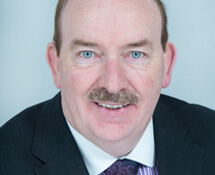
Any healthcare leader surveying the healthcare situation in Ireland and across Europe today and indeed beyond would generally have the same observation, the demands on the sustainability of healthcare systems across the continent are weighing heavily on healthcare finances, personnel resources and ultimately on the wellbeing of patients, writes Gerry O’Dwyer.
With improving patient outcomes the first and foremost objective, a healthcare unit financial performance and reputation also hang in the balance as healthcare leaders attempt to navigate a healthcare landscape that is swiftly changing as we look towards the future.
It is no mystery why healthcare finds itself at these critical crossroads. Life expectancy is on the rise and, simultaneously, so are chronic and complex conditions that require increasingly personalised treatment for best outcomes and prevention. The voice of the patient is also central to the healthcare debate as those receiving care become more knowledgeable, about their rights and the types of care available to them and their loved ones.
At the same time, it could be argued that healthcare is experiencing one of its most exciting phases. Rapid technological advances in diagnostics, treatments and workflow procedures are transforming the healthcare terrain before our eyes. Who could have thought only few years ago that the digital world would impact so deeply on the healthcare environment, improving practice, bringing together professionals from all specialties and connecting patients with carers creating a transparency that could only be imagined a short time ago.
However, advances bring with them responsibility. It is the duty of healthcare professionals to steer the ship on the right course so that we take advantage of all that new developments can offer and guide our practice towards optimum healthcare that we can sustain. Indeed, this theme of sustainability and the need to collectively advance innovative approaches for improvement and expansion of healthcare services globally is required in Europe.
As our International community becomes ever more interconnected, we need to build on those relationships continuing to forge an alliance of healthcare professionals and decision makers across both international and state borders. Through such expert collaboration and shared learning we can articulate the required competencies to contribute to a sustainable health care system and convince our politicians and stakeholders, that public financing of healthcare is not purely a question of cost, but an undeniable investment in the future welfare of people.
The changes in healthcare have been radical but where there are challenges there are also opportunities. Healthcare professionals are increasingly seeking roles that offer better work-life balance and flexible hours. Healthcare employers need to offer flexible work arrangements to attract and retain talent in a competitive job market. The need for flexible staffing practices, especially with fluctuating demand e.g., during pandemics or seasonal illnesses and service pressures.
The vision in Ireland of the Sláintecare Reform Programme being delivered by the Department of Health and the Irish Health Service Executive (HSE) is to provide a single universal health service for all, providing the right care, in the right place, at the right time. At its core, Sláintecare aims to tackle the main problems faced by healthcare in Ireland: patient care, waiting lists, high costs, overreliance on hospitals, and lack of adequate community care. It also seeks to improve access to healthcare and to improve electronic health in Ireland.
The Department of Health and HSE are working together to provide new models of care including the development of primary and community health services to allow people to stay healthy in their homes and communities for as long as possible. The changes required for the implementation of Sláintecare will have far-reaching impacts on the recruitment, scheduling and management of available healthcare employees. Workforce redistribution will be a key component. Sláintecare seeks to enhance community-based care and reduce reliance on hospital settings. As a result, more healthcare professionals, including doctors, nurses, and allied health staff, will be required in primary, community and wellness care roles.
Investment in training and development will need to be advanced in healthcare settings such as upskilling for new models of care, improving working conditions by promoting work-life balance, enhancing professional opportunities, and improving workplace environments. Healthcare will need to adopt strategies to retain talent, especially in light of the competition for healthcare professionals both domestically and internationally.
However, with the implementation of new innovative systems, healthcare providers can streamline key processes such as scheduling, skills tracking, and employee self-service and technology. This not only optimises the allocation of resources but also enhances staff satisfaction by providing greater control over their work-life balance. A number of providers such as Softworks are already working with hospitals across the country transforming their rostering processes with powerful skills-based, automated rostering software while public hospitals are supporting the implementation of the Frameworks for Safe Nurse Staffing and Skill Mix with TrendCare. As the healthcare system navigates reforms like Sláintecare and responds to evolving workforce demands, adopting such innovative solutions will be critical in ensuring a sustainable, efficient, and patient-centred future.
In conclusion, worldwide the healthcare sector face numerous challenges that, if not addressed, could impact the quality of patient care, employee well-being, and the efficiency of the healthcare system. Together with vision and interagency cooperation, we can create a future of health and safety for all the citizens.

